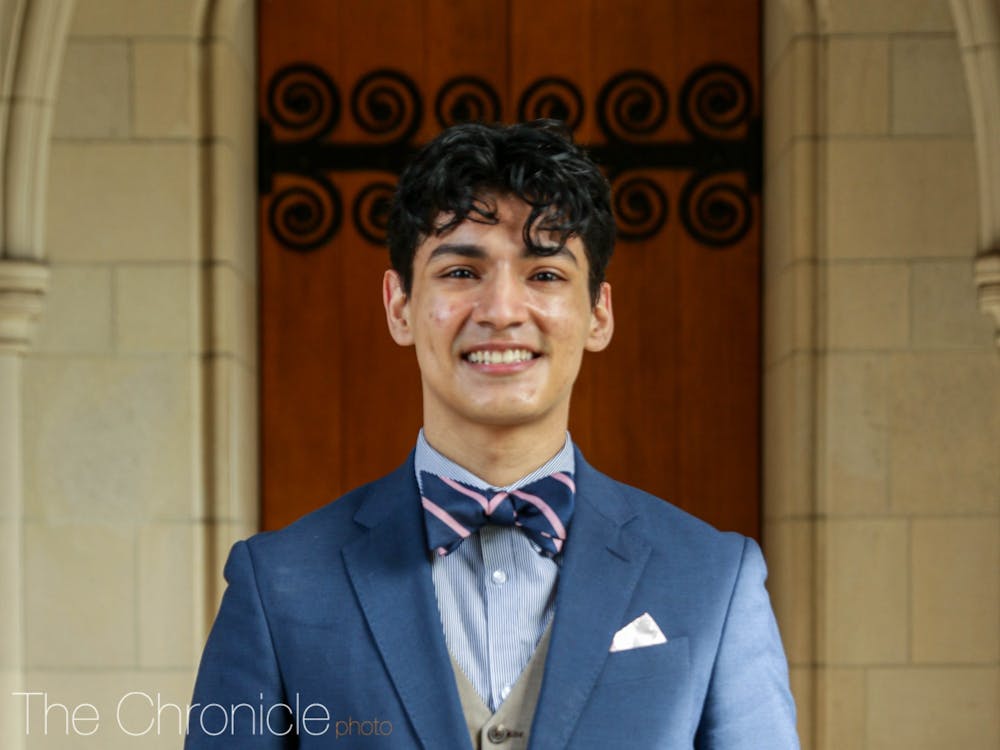Duke Student Government presidential candidate Carlos Diaz, a junior, plans to work closely with student groups and make Duke more equitable for all.
Hailing from a small suburb southwest of Chicago, Diaz is majoring in neuroscience on the pre-med track. He currently serves on the Latinx caucus within DSG and is the president of Mi Gente, where he expanded the Familia program and implemented a peer mentorship program in Durham public schools.
As a facilitator advocating for change and equity at the Center for Multicultural Affairs, he assisted in the creation of multiple databases such as a Black, Indigenous and People of Color Faculty/Staff, BIPOC Triangle Businesses and BIPOC Triangle Restaurants database.
His campaign centers on his experience witnessing failures within DSG—such as the lack of effort when reaching out to identity groups on campus—and pledging to rectify them. This year he noted that there was no outreach from DSG to cultural groups like Mi Gente.
“Students should not have to reach out incessantly in the hopes of being heard. The student government should be working for the student body, not the other way around,” Diaz wrote on his campaign website.
“DSG is meant to represent everybody, not just a few senators in the room,” Diaz said.
Diaz promised to uphold DSG’s commitment to consulting with underrepresented student groups on campus and increasing transparency in funding.
“At the end of the day, I’m only one person. I’ll never be able to quite gain the level of understanding of every community that should be and so that’s why I want to surround myself with people who do know a lot about each and every community,” he said.
Diaz added he is not someone to “push conflict aside” and instead likes to “address it head-on.”
“If there’s a project I think is problematic or a project I think does not have much use, I’m going to speak up and I’m going to make sure I’m inviting people who will speak up,” he said.
Diaz plans to work with identity centers and student groups to demand institutional funding for stoles and identity graduation ceremonies.
Last summer, he worked on the Student Advisory Board to plan the 2020-2021 school year along with various departments, working to center on the voices of BIPOC members of the Duke and Durham communities to get input.
Following the announcement that upperclassmen would not have housing on campus just three weeks before classes started, he voiced student concerns to administrators that this policy was inequitable for low-income students, exacerbating housing insecurity and declining mental health for some students and contributing to gentrification in the downtown Durham area.
“I’m okay being completely honest with anyone I need to be honest with. I don’t care too much for upholding images for being friendly, for putting on this facade,” Diaz noted of his readiness to face conflict when necessary. “I want things to be done and I want people to hear what needs to be heard.”
Part of Diaz’s platform aims to expand the course cost transparency tool and factor hidden costs into financial aid. He added that he seeks to make it easier for students to waive the Duke insurance fee. Additionally, he hopes to expand the use of leftover food points.
“A lot of students have so much leftover and the fact that we can’t use it in any other way is a little ridiculous. I am hoping to be able to push those for some kind of Duke credit at the store or for laundry or even for parking passes,” he said.
He also plans to create a career closet for students to borrow clothing for interviews, career fairs and conferences.
Diaz seeks to implement required sexual assault training for all student groups and strengthen no-contact directives for victims of assault, which allow students who report an assault to request no physical or virtual contact with their perpetrator. His platform also emphasizes making students feel safer on campus through more blue lights and an institutional partnership with Noonlight, a safety app already partnered with several peer institutions.
Senior Jamal Burns, a friend of Diaz’s, was eager to commend Diaz as proving himself capable of "locating insufficiencies” with the status quo.
“Throughout his time at Duke, he has invested his time in bettering the lived experience of marginalized communities and Duke more broadly,” Burns said.
Rebecca Ewing, a lecturing fellow of Romance Studies who had Diaz as a student in the course Latinx Voices in Duke, Durham, and Beyond, wrote in an email to The Chronicle that “Carlos has proven to be deeply committed to social justice in service to his communities at Duke, in Durham, and beyond.”
“He is unafraid to engage in difficult conversations surrounding race, class, gender, national origin and the intersectionality of these and other identities in order to work towards a more equitable society,” Ewing wrote. “He has challenged me as an instructor to examine my own inherent biases, demonstrating respectful dialogue and impressive leadership. Carlos will lead Duke Student Government with empathy and critical thought and reflection.”
Correction: An earlier version of this story misstated the amount of time between Duke's announcement that upperclassmen would not have fall campus housing and the start of classes. It was three weeks, not two weeks. The Chronicle regrets the error.
Get The Chronicle straight to your inbox
Signup for our weekly newsletter. Cancel at any time.

Paige Carlisle is a Trinity senior and a staff reporter for The Chronicle.

